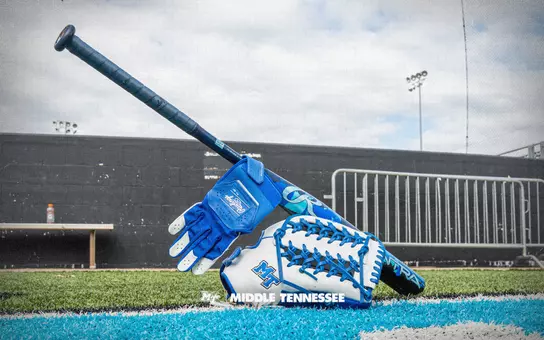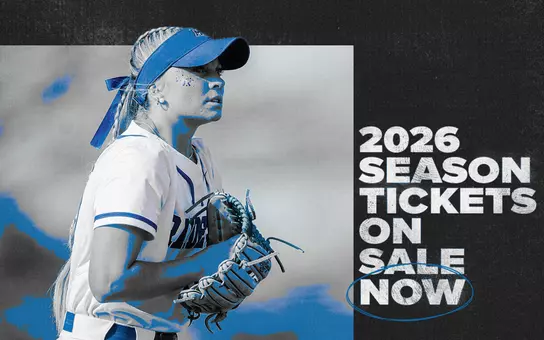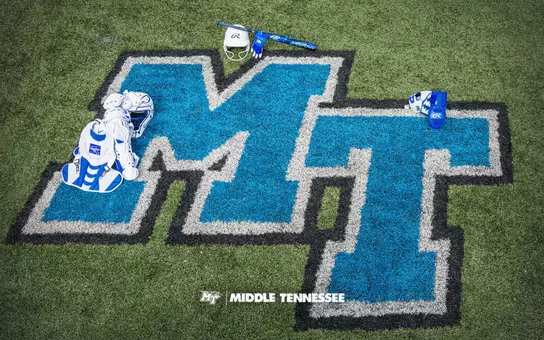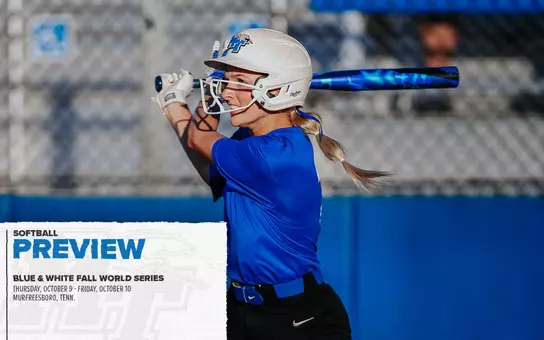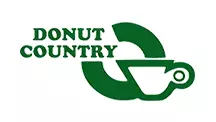Middle Tennessee State University Athletics
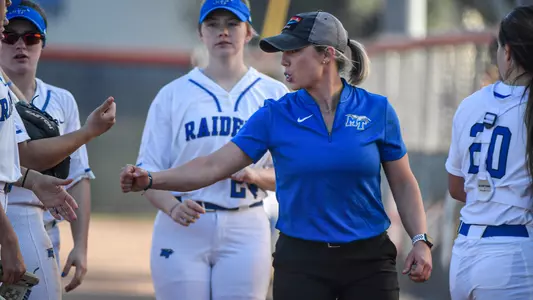
Coach Hawkins talks approach at the plate and coaching MT hitters
6/21/2020 12:00:00 PM | Softball
MURFREESBORO, Tenn. — Just a few months after Middle Tennessee softball won its first Conference USA championship in 2018, former South Carolina outfielder Chelsea Hawkins was brought on board to help take the program's recent success to the next level.
In Hawkins' first year in Murfreesboro, the Blue Raiders advanced to their third ever postseason tournament and second in as many seasons. Then, MT's offense seemed to turn a corner in Hawkins' second season in the Blue Raider dugout.
Even in a season shortened by COVID-19, Hawkins' instructions put the 2020 Blue Raiders among the best offensive teams the program has seen in its 28 years. Despite playing half of its scheduled games, the 2020 team was tied for sixth with 28 homers, was second in slugging percentage (.433) and on base percentage (.360), and was third in stolen base percentage (.872).
Hawkins brings with her an incredible experience as a player at South Carolina and has already gotten off to a great start in her coaching career. When she graduated in 2014, she was third in career homers (21) and first in career fielding percentage (.983) at South Carolina, where she led the Gamecocks to two NCAA Regionals.
She traded in her cleats for a clipboard immediately after graduation, making stops in the dugouts at South Carolina, UNC Greensboro and Gardner-Webb before arriving in Murfreesboro in August 2018.
Hawkins recently sat down with GoBlueRaiders.com to relive her experiences in the sport and explain her coaching style.
What made you fall in love with softball as a kid?
My entire family played softball. My grandma played, my mom played, and probably the biggest influence on my life was my aunt. She was 10 years older than me, and she also played softball at South Carolina. We were 10 years apart, so when I was nine or 10 years old, she was playing at South Carolina, and she was always a big inspiration to me and someone that I looked up to. My whole family is a softball family, so it's just in my blood.
What are some lessons you learned from Coach Beverly Smith while playing at South Carolina?
One of the biggest things I learned from her is 'How you do one thing is how you do everything.' What I mean by that is that she always had a standard for us in everything that we did. From the softball field to the classroom to how we dressed to how we carried ourselves, that was something she instilled in all of us. Not only did she say it, but she walked it too. She's a great woman and a great leader, and she's still one of my friends and mentors to this day. Everything that we did had a standard tied to it, and that's something I still try to live throughout my life today. You can't just pick and choose when you want to be disciplined. You can't just pick and choose when you want to be great or be a champion. That's something you have to instill in every aspect of your life.
After your graduation, you went right into coaching. What was the transition like from playing on the diamond to coaching in the dugout?
It was not easy. If anyone could ask 'Would you rather coach, or would you rather play?' I think all of us would rather be out there playing. It wasn't easy. I was also getting my master's degree when I started coaching, so that was tough on me time management-wise. I also had a really great group of girls in Greensboro, and I had another great mentor in Janelle Breneman, and they definitely made the transition as easy as it could've been. I think the best part for me was that I was so young and fresh out of college that the girls gravitated towards me more, so I had to learn how to use that to my advantage. I was able to see eye-to-eye with them and be able to relate to them, and I think that made them gravitate towards me more. I just had to learn how to use that to my advantage and be able to say 'Look, I know what you're going through, I've been there,' and try to lead them to being not only the best player they can be, but the best person they can be.
You're in charge of our hitters here at MT. What are some of the first things you teach our new Blue Raiders when they first get to campus?
The first thing I usually do with our new hitters is take video. That's pretty much the only thing we do on the first day, and it's only 10 or 20 swings. Then I sit down with them individually, and we talk about the things that I teach, then I show them out of those things what they already do well. I say 'This is what you do well, and this is your strength...' We're Division I. Most of these girls already do these things, so I just make sure to point out to them that we'll talk about these things, but I want them to know what they already do well. Now, it's just them being able to feel and understand when they do things well and when they don't do it. I try to pick out one or two things that I think will help them be even better, and those are the one or two things that we work with them on throughout the fall. We'll still work on it throughout the spring, but the things we do in the fall are more mechanical stuff. The spring is a little more mental on the approach side: what pitch they're looking for and what pitch they might get.
We have so many players that are a home run threat when they step up to bat. As a power hitter yourself, what is it like to coach those players that remind you of yourself, and how do you help them with their approach?
It's extremely fun to coach our hitters, especially when you look at someone like Lexi [Cushing] or Jocelynn [De La Cruz], those kids that definitely have home run power. I hit home runs, but I wasn't really born to do that. When you look at my size compared to some of these girls and especially some in the SEC, I was small, so my mentality was to swing as hard as I could and put the best swing on every single pitch. No matter if I missed or if I hit it, I always wanted to make sure I took my absolute best swing. That's something I try to get them to do every time. When you are a good hitter, such as Lexi, and you see that she's set all these records, it's very easy to get in your head and try to be that perfect hitter every single time you go up to bat. When you try to be perfect, you're hindering your body from doing what it's supposed to do. That's something that I've been trying to instill in them: I want your best swing every time, and I want a hard swing. Obviously, it has to be controlled, but I want them to swing their best every single time and make sure they're not trying to be perfect.
Also, with our bigger hitters, I work a lot on plan and approach. I want them to not just look for a pitch but be able to capitalize on it when it comes. That's something I know I've done a lot with Lexi. When you put her swing on video, it's almost textbook. So, when I first got here, we didn't really talk mechanics. I just said 'Your swing is there. These are the things that I teach, and you do them already. What we're going to do is work on your plan, your approach, being able to know what pitch you're looking for, and being able to capitalize on it.' That's huge for the upperclassmen because as coaches and teams start to scout your team and know more about you, you have to be able to either hit what you know the pitcher is going to throw you or be able to capitalize when they make a mistake. When they throw you that pitch that they didn't mean to pitch, you've got to be ready for it. Those are the things I talk a lot more about with our big hitters.
Follow the Blue Raiders on Twitter (@MT_Softball), Facebook (Blue Raider Softball) and Instagram (@mt_softball).
In Hawkins' first year in Murfreesboro, the Blue Raiders advanced to their third ever postseason tournament and second in as many seasons. Then, MT's offense seemed to turn a corner in Hawkins' second season in the Blue Raider dugout.
Even in a season shortened by COVID-19, Hawkins' instructions put the 2020 Blue Raiders among the best offensive teams the program has seen in its 28 years. Despite playing half of its scheduled games, the 2020 team was tied for sixth with 28 homers, was second in slugging percentage (.433) and on base percentage (.360), and was third in stolen base percentage (.872).
Hawkins brings with her an incredible experience as a player at South Carolina and has already gotten off to a great start in her coaching career. When she graduated in 2014, she was third in career homers (21) and first in career fielding percentage (.983) at South Carolina, where she led the Gamecocks to two NCAA Regionals.
She traded in her cleats for a clipboard immediately after graduation, making stops in the dugouts at South Carolina, UNC Greensboro and Gardner-Webb before arriving in Murfreesboro in August 2018.
Hawkins recently sat down with GoBlueRaiders.com to relive her experiences in the sport and explain her coaching style.
What made you fall in love with softball as a kid?
My entire family played softball. My grandma played, my mom played, and probably the biggest influence on my life was my aunt. She was 10 years older than me, and she also played softball at South Carolina. We were 10 years apart, so when I was nine or 10 years old, she was playing at South Carolina, and she was always a big inspiration to me and someone that I looked up to. My whole family is a softball family, so it's just in my blood.
What are some lessons you learned from Coach Beverly Smith while playing at South Carolina?
One of the biggest things I learned from her is 'How you do one thing is how you do everything.' What I mean by that is that she always had a standard for us in everything that we did. From the softball field to the classroom to how we dressed to how we carried ourselves, that was something she instilled in all of us. Not only did she say it, but she walked it too. She's a great woman and a great leader, and she's still one of my friends and mentors to this day. Everything that we did had a standard tied to it, and that's something I still try to live throughout my life today. You can't just pick and choose when you want to be disciplined. You can't just pick and choose when you want to be great or be a champion. That's something you have to instill in every aspect of your life.
After your graduation, you went right into coaching. What was the transition like from playing on the diamond to coaching in the dugout?
It was not easy. If anyone could ask 'Would you rather coach, or would you rather play?' I think all of us would rather be out there playing. It wasn't easy. I was also getting my master's degree when I started coaching, so that was tough on me time management-wise. I also had a really great group of girls in Greensboro, and I had another great mentor in Janelle Breneman, and they definitely made the transition as easy as it could've been. I think the best part for me was that I was so young and fresh out of college that the girls gravitated towards me more, so I had to learn how to use that to my advantage. I was able to see eye-to-eye with them and be able to relate to them, and I think that made them gravitate towards me more. I just had to learn how to use that to my advantage and be able to say 'Look, I know what you're going through, I've been there,' and try to lead them to being not only the best player they can be, but the best person they can be.
You're in charge of our hitters here at MT. What are some of the first things you teach our new Blue Raiders when they first get to campus?
The first thing I usually do with our new hitters is take video. That's pretty much the only thing we do on the first day, and it's only 10 or 20 swings. Then I sit down with them individually, and we talk about the things that I teach, then I show them out of those things what they already do well. I say 'This is what you do well, and this is your strength...' We're Division I. Most of these girls already do these things, so I just make sure to point out to them that we'll talk about these things, but I want them to know what they already do well. Now, it's just them being able to feel and understand when they do things well and when they don't do it. I try to pick out one or two things that I think will help them be even better, and those are the one or two things that we work with them on throughout the fall. We'll still work on it throughout the spring, but the things we do in the fall are more mechanical stuff. The spring is a little more mental on the approach side: what pitch they're looking for and what pitch they might get.
We have so many players that are a home run threat when they step up to bat. As a power hitter yourself, what is it like to coach those players that remind you of yourself, and how do you help them with their approach?
It's extremely fun to coach our hitters, especially when you look at someone like Lexi [Cushing] or Jocelynn [De La Cruz], those kids that definitely have home run power. I hit home runs, but I wasn't really born to do that. When you look at my size compared to some of these girls and especially some in the SEC, I was small, so my mentality was to swing as hard as I could and put the best swing on every single pitch. No matter if I missed or if I hit it, I always wanted to make sure I took my absolute best swing. That's something I try to get them to do every time. When you are a good hitter, such as Lexi, and you see that she's set all these records, it's very easy to get in your head and try to be that perfect hitter every single time you go up to bat. When you try to be perfect, you're hindering your body from doing what it's supposed to do. That's something that I've been trying to instill in them: I want your best swing every time, and I want a hard swing. Obviously, it has to be controlled, but I want them to swing their best every single time and make sure they're not trying to be perfect.
Also, with our bigger hitters, I work a lot on plan and approach. I want them to not just look for a pitch but be able to capitalize on it when it comes. That's something I know I've done a lot with Lexi. When you put her swing on video, it's almost textbook. So, when I first got here, we didn't really talk mechanics. I just said 'Your swing is there. These are the things that I teach, and you do them already. What we're going to do is work on your plan, your approach, being able to know what pitch you're looking for, and being able to capitalize on it.' That's huge for the upperclassmen because as coaches and teams start to scout your team and know more about you, you have to be able to either hit what you know the pitcher is going to throw you or be able to capitalize when they make a mistake. When they throw you that pitch that they didn't mean to pitch, you've got to be ready for it. Those are the things I talk a lot more about with our big hitters.
Follow the Blue Raiders on Twitter (@MT_Softball), Facebook (Blue Raider Softball) and Instagram (@mt_softball).
Facility tour – Stephen and Denise Smith Student-Athlete Performance Center
Wednesday, July 30
Spring Sports Show hosted by The Boulevard – April 21, 2025: Softball and Baseball
Monday, April 21
MTSU Softball vs WKU Recap 4/11-13/25
Monday, April 14
MTSU Softball vs WKU Recap 4/11-13/25 2025
Monday, April 14
